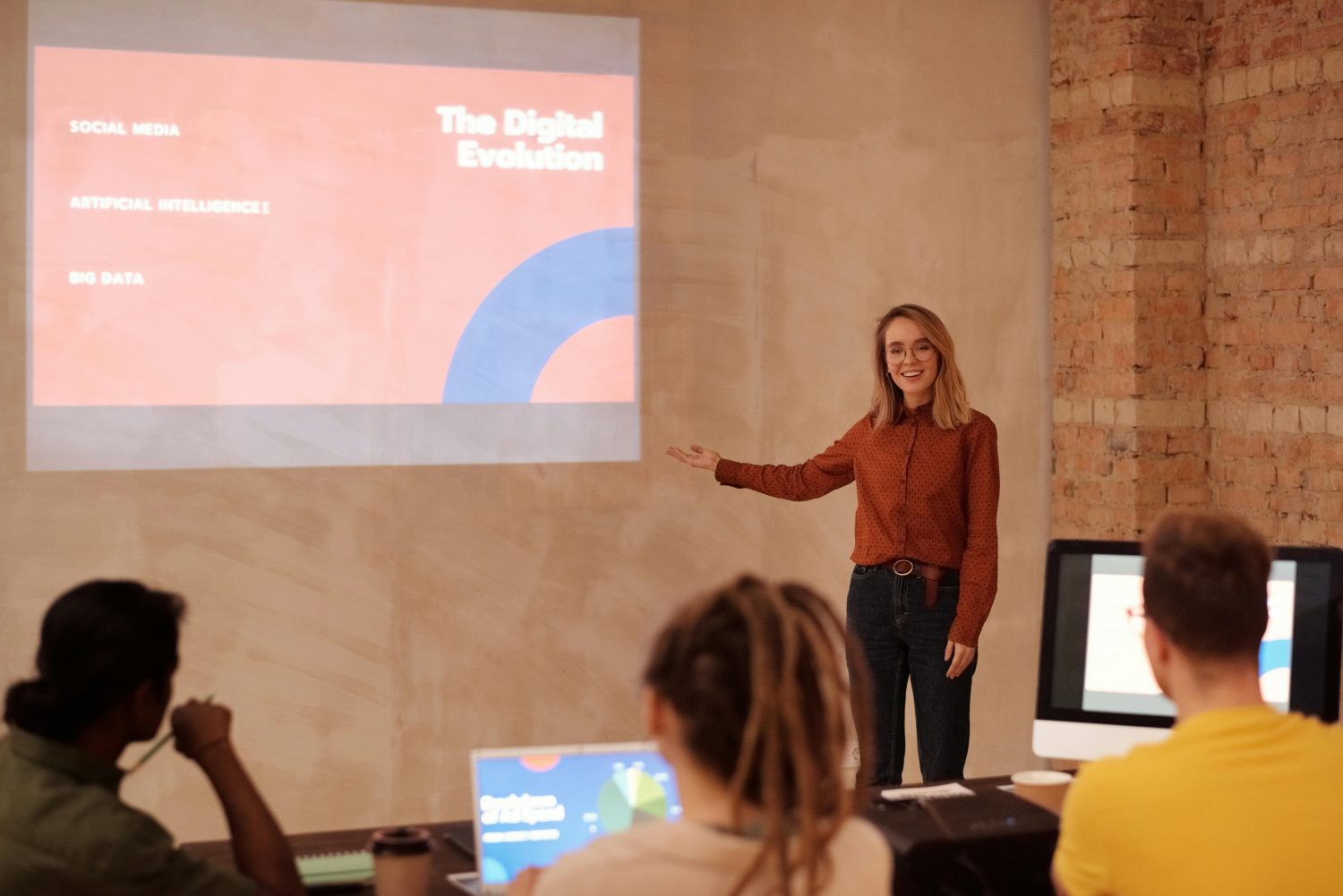Artificial Intelligence (AI) has helped evolve various industries, and content creation is no different. From generating compelling articles to crafting engaging social media posts, AI tools have significantly changed the way content is produced and consumed. In this article, we’ll explore the impact of AI on content creation, its benefits, challenges, and the future trends shaping this dynamic field.
Understanding AI in Content Creation
AI refers to the simulation of human intelligence processes by machines, especially computer systems. In content creation, AI technologies use machine learning algorithms and natural language processing (NLP) to analyze data, understand patterns, and generate content that target audiences are looking for .
1. AI-Powered Content Generation
One of the most common applications of AI in content creation is automated content generation. AI-powered tools like GPT-3 (Generative Pre-trained Transformer 3) can create human-like text based on prompts provided to them. These tools analyze vast amounts of data from the web to learn context, style, and grammar, allowing them to create high-quality articles, blog posts, product descriptions, and more.
AI-generated content is not only efficient but also scalable. It allows businesses and content creators to produce large volumes of content quickly without ignoring quality. For instance, news agencies use AI to generate real-time news updates, while e-commerce platforms employ AI to create product descriptions tailored to customer preferences.
2. Personalized Content Recommendations
AI algorithms analyze user behavior and preferences to deliver personalized content recommendations. Platforms like Netflix and Spotify use AI to recommend movies, shows, and music based on individual viewing or listening history. This level of personalization increases user engagement and satisfaction, driving higher conversion rates and customer retention.
In digital marketing, AI-powered content recommendation engines help businesses deliver relevant content to their audiences at the right time. By analyzing user interactions and feedback, AI identifies content that aligns with user interests, improving overall content engagement metrics.
3. Enhanced SEO and Content Optimization
AI plays a crucial role in Search Engine Optimization (SEO) by optimizing content for better search engine rankings. AI tools analyze keyword trends, competition, and user intent to recommend SEO-friendly keywords and phrases. Content creators can use this data to tailor their content strategy, improve organic visibility, and drive more traffic to their websites.
Moreover, AI-powered tools assist in content optimization by suggesting improvements in readability, structure, and relevance. For example, tools like Yoast SEO analyze content against SEO best practices and provide recommendations for enhancing readability and SEO performance.
4. Natural Language Generation (NLG) for Data-Driven Content
Natural Language Generation (NLG) is a subset of AI that turns structured data into human-readable text. NLG algorithms analyze data sets, extract insights, and generate reports, summaries, and narratives in natural language. This is particularly useful in industries like finance, healthcare, and journalism, where data-driven insights need to be communicated clearly and effectively.
In marketing, NLG enables brands to create data-driven content such as financial reports, market analysis, and customer insights. By automating the generation of complex reports, NLG frees up valuable time for marketers to focus on strategy and creative tasks.
5. AI in Visual and Multimedia Content Creation
AI extends beyond text-based content creation to visual and multimedia content. AI-powered tools like Adobe Sensei and Canva’s Design Tool use machine learning to assist designers in creating compelling visuals, graphics, and videos. These tools automate tasks such as image editing, video production, and graphic design, enabling marketers and content creators to produce professional-quality visuals efficiently.
AI also enhances creativity in content creation by providing inspiration, generating design variations, and suggesting improvements based on user input and historical data. This helps content creators to experiment with new ideas and maintain a consistent brand identity across different media channels.
Challenges and Considerations
While AI offers substantial benefits in content creation, there are challenges and ethical considerations that businesses and content creators must address:
1. Quality and Originality
AI-generated content must maintain quality and originality to resonate with human audiences. Content creators should oversee AI-generated drafts to ensure accuracy, relevance, and adherence to brand voice and guidelines.
2. Ethical Use of AI
The ethical use of AI in content creation involves transparency, accountability, and compliance with data privacy regulations. Businesses must disclose when content is AI-generated and ensure that AI algorithms do not allow biases or misinformation.
3. Integration with Human Creativity
AI complements human creativity but cannot replace it entirely. Content creators should collaborate with AI tools to leverage their capabilities while bringing their unique insights and creative vision to the content creation process.
Future Trends in AI and Content Creation
Looking ahead, several trends are shaping the future of AI in content creation:
1. Advanced Personalization
AI will continue to evolve, offering more detailed personalization based on real-time user data and behavioral insights. Content will become even more tailored to individual preferences, enhancing user engagement and satisfaction.
2. Multi-lingual and Cross-platform Capabilities
AI-powered translation and localization tools will enable businesses to create and distribute content seamlessly across global markets and platforms. These tools will support multilingual content creation, enhancing reach and accessibility for diverse audiences.
3. Augmented Reality (AR) and Virtual Reality (VR)
AI-driven technologies will play a significant role in creating immersive AR and VR experiences. Content creators will use AI to develop interactive and personalized AR/VR content, transforming how users engage with brands and products.
Conclusion
In conclusion, AI has improved content creation by enabling automation, personalization, and optimization at scale. From creating text-based articles to enhancing visual content and improving SEO, AI-powered tools help businesses and content creators to innovate and deliver compelling experiences to their audiences. As AI technology advances, its role in content creation will continue to expand, driving efficiency, creativity, and ROI for organizations across industries.
Embracing AI in content creation requires a strategic approach that balances technological capabilities with human creativity and ethical considerations. By leveraging AI’s strengths and integrating it into content strategies, businesses can stay ahead of the curve and capitalize on the transformative power of AI in the digital age.
FAQ
What is AI’s role in content creation?
AI plays a pivotal role in content creation by automating tasks such as generating text, optimizing content for SEO, creating visuals, and providing personalized recommendations. It enhances efficiency, scalability, and creativity in content production across various platforms and industries.
How accurate is AI-generated content?
AI-generated content, powered by advanced algorithms like GPT-3 and NLG models, can produce high-quality content that closely mimics human writing. However, the accuracy and quality depend on the training data, prompts provided, and oversight by content creators to ensure relevance and authenticity.
Can AI replace human creativity in content creation?
AI complements human creativity by automating repetitive tasks and providing data-driven insights. While AI excels in generating data-driven content and optimizing processes, human creativity is essential for setting strategic direction, crafting unique narratives, and maintaining brand voice and authenticity.
What are the ethical considerations of using AI in content creation?
Ethical considerations include transparency in disclosing AI-generated content, ensuring accuracy and originality, and avoiding biases or misinformation perpetuated by AI algorithms. Businesses must adhere to data privacy regulations and ethical guidelines to build trust with audiences and maintain integrity in content creation practices.
How can businesses integrate AI into their content creation strategies effectively?
Businesses can integrate AI by leveraging tools for automated content generation, SEO optimization, personalized recommendations, and visual content creation. It’s essential to align AI capabilities with business goals, monitor performance, and continuously refine strategies to enhance engagement, conversion rates, and overall content quality.
Featured Image Credit: Photo by vecstock; Freepik; Thank you!









